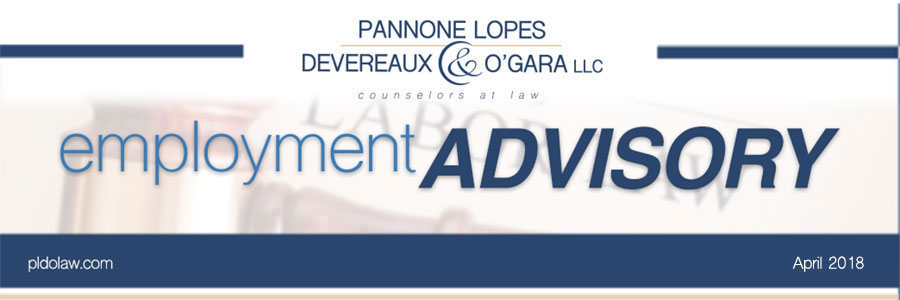 |
PRIOR SALARY HISTORY MAY NOT ALWAYS BE LAWFUL BASIS TO SET PAY
The Equal Pay Act provides that men and women should receive equal pay for equal work. In a recent case, Rizo v. Yovino, No. 16-15372 (Apr. 9, 2018), the United States Court of Appeals for the Ninth Circuit held that an employer cannot justify a wage difference between male and female employees by relying on prior salary. In looking at this issue, the Ninth Circuit conclusively held that prior salary alone, or even in combination with other factors, cannot justify a wage differential between a woman and man performing the same job. wage difference between male and female employees by relying on prior salary. In looking at this issue, the Ninth Circuit conclusively held that prior salary alone, or even in combination with other factors, cannot justify a wage differential between a woman and man performing the same job.
The case involved an employer that paid a female employee, Aileen Rizo, less than her male colleagues for similar work. The employer argued that it had not violated the Equal Pay Act because it reached the decision to pay Rizo a different salary based upon her salary history, which, according to the employer, was a factor other than her sex and therefore a proper consideration.
The Court emphasized that prior salary is not a legitimate measure of work experience, ability, performance or any other job-related quality. Going further, the Court declared that using prior salary to determine pay between two equally qualified and experienced colleagues would only perpetrate the wage disparities prohibited by the Equal Pay Act.
Rather than salary history, the Court noted that an employer may properly look at prospective employees’ experience, educational background, abilities or prior job performance when setting their salaries, as these traits are all unrelated to sex. Rizo provides the following guidance for employers: do not offer a female employee a lower salary than a male colleague to perform the same work if that decision is based on the female employee’s prior salary history.
[back to top]
SUPREME COURT ISSUES DECISION ON FLSA EXEMPTION
On April 2, 2018, the United States Supreme Court issued a decision on the Fair Labor Standards Act (“FLSA”) exemption that provides the FLSA’s overtime pay requirement does not apply to any salesmen, partsmen, or mechanics primarily engaged in selling or servicing automobiles, trucks or farm implements. This exemption had long been  understood to include “service advisors”: employees of car dealerships who consult with customers about their service needs. Several service advisors sued their employer, Encino Motorcars LLC, and claimed that they were entitled to overtime pay pursuant to the FLSA. The lower court found that the FLSA was ambiguous as to service advisors and that the service advisors therefore should be entitled to overtime pay. understood to include “service advisors”: employees of car dealerships who consult with customers about their service needs. Several service advisors sued their employer, Encino Motorcars LLC, and claimed that they were entitled to overtime pay pursuant to the FLSA. The lower court found that the FLSA was ambiguous as to service advisors and that the service advisors therefore should be entitled to overtime pay.
The Supreme Court reversed. In Encino Motorcars, LLC v. Navarro, No. 16-1362 (Apr. 2, 2018), the Court concluded that service advisors sell service related to automobiles and that the FLSA exemption applied to them. In reaching this conclusion, the Supreme Court rejected the lower court’s narrow reading of the exemption and noted that “there is no reason to give [the exemptions] anything other than a fair (rather than a narrow) interpretation.”
For employers outside of the automobile sales and repair industry, the Court’s analysis signals that the Supreme Court may begin to apply a broader and more pro-employer approach to other FLSA exemptions, which in previous years have been narrowly construed both by the Department of Labor and the federal courts.
Encino Motors also confirms that all employers must carefully weigh whether a specific employee falls into a specific FLSA exemption. While Encino Motors ultimately won this case, it came at the cost of years of expensive litigation. The lengthy travel of this case—all the way to the Supreme Court—highlights the risk to employers if they misclassify an employee or take a debatable position when classifying an employee as exempt.
[back to top]
RSVP REQUESTED: “PREVENTING SEXUAL HARASSMENT IN YOUR ORGANIZATION" SEMINAR SCHEDULED FOR MAY 23
To help organizations better address, prevent and manage workplace sexual harassment, PLDO and Starkweather & Shepley Insurance Brokerage Inc. are teaming up to present a free seminar, entitled “Sexual Harassment: Learn What You Should Know for Your Business in the #MeToo Era.” The seminar is scheduled for Wednesday, May 23, 2018 from 8:30 a.m. to  10 a.m. at the Crowne Plaza Grand Ballroom in Warwick, RI. Business owners, nonprofit executives and HR managers are encouraged to attend. Registration is required and sign-in begins at 8 a.m. Complimentary breakfast will be served. For more information and to register, visit seminar registration. 10 a.m. at the Crowne Plaza Grand Ballroom in Warwick, RI. Business owners, nonprofit executives and HR managers are encouraged to attend. Registration is required and sign-in begins at 8 a.m. Complimentary breakfast will be served. For more information and to register, visit seminar registration.
“Employers are dealing with complicated employee issues today,” said PLDO Principal William E. O’Gara, who leads the firm’s Employment Law and Litigation teams. “The explosion of headline news alleging sexual harassment and the #MeToo movement has caused employers to seek out more information to understand the legal standards of sexual harassment claims, how to develop organizational policies that are meaningful to employees and in compliance with the law, and most importantly, how to build a culture of respect in the workplace that encourages zero tolerance of sexual harassment. This seminar intends to help business owners, nonprofit executives and HR managers to do just that.”
Joining Attorney O’Gara on the seminar panel are Sean Cottrell, SVP, Human Services Leader at Starkweather & Shepley Insurance Brokerage, Inc., and Aimée DuVall Phelps, Ph.D., Director of the University of Rhode Island Schmidt Labor Research Center and Teaching Professor in the College of Business Administration. Topics to be covered include current trends and the law, filing and managing claims, policies and best practices, and investigating and reporting.
According to the recent study How Organizational Policies Influence Bystander Likelihood of Reporting Moderate and Severe Sexual Harassment at Work, zero-tolerance polices within an organization increase a bystander’s willingness to report sexual harassment. This is the first study to show the influence that a zero-tolerance policy versus a standard policy statement can have on a person’s willingness to report sexual harassment incidents that they witness. In addition, in a study published in the American Psychological Association Journal of Occupational Health Psychology, researchers found that employees who report being victims of sexual harassment can manifest anxiety and eating disorders, depression, drug and alcohol abuse, post-traumatic stress and lower levels of overall happiness.
To register for the May 23 event, please visit seminar registration or for help with your organization’s sexual harassment policies, please contact Attorney O’Gara at 401-855-2601 or email wogara@pldolaw.com. You can also watch Attorney O’Gara’s latest informational video on Achieving Zero Tolerance of Sexual Harassment in the Workplace.
[back to top]
|
 |





 wage difference between male and female employees by relying on prior salary. In looking at this issue, the Ninth Circuit conclusively held that prior salary alone, or even in combination with other factors, cannot justify a wage differential between a woman and man performing the same job.
wage difference between male and female employees by relying on prior salary. In looking at this issue, the Ninth Circuit conclusively held that prior salary alone, or even in combination with other factors, cannot justify a wage differential between a woman and man performing the same job.  understood to include “service advisors”: employees of car dealerships who consult with customers about their service needs. Several service advisors sued their employer, Encino Motorcars LLC, and claimed that they were entitled to overtime pay pursuant to the FLSA. The lower court found that the FLSA was ambiguous as to service advisors and that the service advisors therefore should be entitled to overtime pay.
understood to include “service advisors”: employees of car dealerships who consult with customers about their service needs. Several service advisors sued their employer, Encino Motorcars LLC, and claimed that they were entitled to overtime pay pursuant to the FLSA. The lower court found that the FLSA was ambiguous as to service advisors and that the service advisors therefore should be entitled to overtime pay.